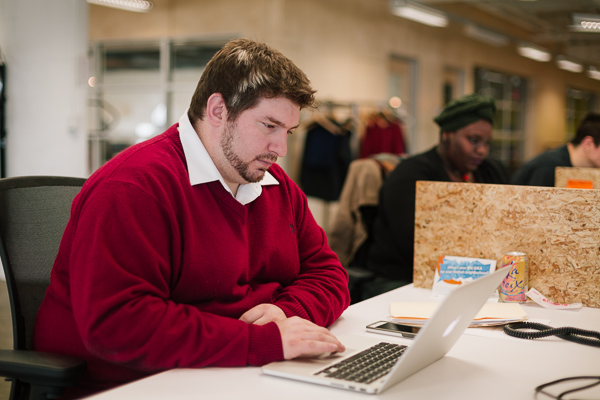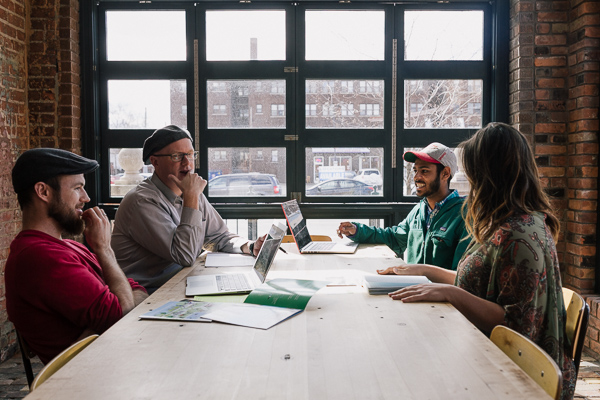Once upon a time, getting money for a community development project or a new business venture involved going to a bank, maxing out a credit card, or asking friends and family for money.
But when Ginosko Development Company was looking to build a community garden in its affordable housing rehab project on Detroit's northwest side, it turned to crowdfunding. The campaign ended up raising $27,585, allowing Ginosko to plan and construct It Takes a Village Garden at Votrobeck Playground.
Mary Tischler, Ginosko's chief financial officer, notes that while many donors were friends and family, the crowdfunding campaign brought in additional donors and substantial publicity. It also gave Ginosko access to a dollar-for-dollar matching grant program through a partnership between Detroit-based crowdfunding platform
Patronicity and the
Michigan Economic Development Corporation.
In its first year, the project served as a focal point for the community, providing fresh produce and beauty in a space that had been filled with broken-down, rusty playground equipment.
"I think the residents are thrilled. Kids love it here," Tischler says. "It's such a natural playground for everybody."
New ways to fundraise
In 2009, Kickstarter and
Indiegogo were virtually the only crowdfunding platforms available to people and organizations looking for nontraditional ways to raise funds for projects.
Detroit Soup, a decidedly non-technology-based crowdfunding event that uses old-fashioned in-person voting to award projects with funds, launched in 2010. Since then, for-profit local platforms like Patronicity and Royal Oak-based
Crowdrise have launched alongside newer national and international ones like
GoFundMe. In 2015, there were over
100 platforms available worldwide with various niches in art, community development, and even personal emergencies.
But while crowdfunding campaigns can be a boon, they can also exact a cost to the organizations running them. Most crowdfunding platforms take anywhere from a 3-5 percent cut of the donations and may charge other fees.
The Detroit Food Academy ran successful crowdfunding campaigns in 2012, 2013 and 2014 on Kickstarter, Indiegogo, and Patronicity before taking 2015 off due to the workload demands of running a campaign. They aren't yet sure whether they'll launch a campaign in 2016.
"It takes a substantial amount of time and effort to promote and follow up [a campaign]," says DFA's executive director Jen Rusciano. "But getting your name out there is just as valuable as the funds raised."
Michigan Urban Farming Initiative in Detroit's North End has run several successful campaigns on Crowdrise, but founder and president Tyson Gersh doesn't necessarily recommend crowdfunding.
"It's really difficult to run a campaign. You have to do a lot of legwork," Gersh says. "And crowdfunding too often is used as an excuse for traditional funding streams to ignore smaller-scale grassroots organizations. There's this idea they can just go figure it out on their own."
A grassroots approach
 Joe Rashid and Rhiannon Chester
Joe Rashid and Rhiannon Chester
While the landscape for crowdfunding platforms might appear a little--err--crowded, Brooklyn, New York-based nonprofit crowdfunding platform
ioby is launching a new office with two full-time staff in the city this week. The venture has $300,000 in backing from the Kresge Foundation for three years and an additional $200,000 from the Ford Foundation for one year. The platform is also launching staffed offices in Cleveland, Washington D.C. and Pittsburgh this year.
"We think there's a lot of opportunity in Detroit for this kind of work," says Katie Lorah, director of communications and creative strategy for ioby.
To support their work in Detroit, ioby has hired on two full-time community organizers: Joe Rashid, who worked previously with Brightmoor Alliance, and Rhiannon Chester, who worked previously with
LGBT Detroit.
Rashid, a veteran Detroit community organizer, is optimistic about ioby's grassroots strategy. "Their approach isn't just crowdfunding, it's crowd-resourcing," he says. "It's not just about raising money, it's about raising human capital and making sure resources are connected to the people who need them the most."
While ioby is set to hit the ground running here, the nonprofit will also be working on its business model so that it can live beyond its foundation grants.
"Our goal in the next few years is to become less reliant on one-time funding," Lorah says, "and scale up to the degree that earned income -- things like platform fees, optional 'gratuity' from donors and fees-for-service -- can support the bulk of our operations."
Bryan Hogle, program officer with the Kresge Foundation, says Kresge's grant to ioby underscores the foundation's goals to build neighborhoods and civic capacity. "What we see in ioby that we think is really unique -- because there are a number of crowdsourcing models here already in Detroit -- is a capacity-building model looking to raise up resident leaders in neighborhoods," he says.
Leveraging partnerships
 Patronicity team at work
Patronicity team at work
Approaches to crowdfunding differ across platforms. Patronicity recruits projects by reaching out to local governments and through partnerships with organizations like the MEDC and Michigan Municipal League.
"The projects themselves end up becoming modes of referral," says Patronicity CEO Chris Blauvelt. "One town does a project, and then their neighbor sees it and wants to bring the benefits of this program to their city. After a while, it becomes an organic, self-replicating marketing."
But that doesn't mean Patronicity is hands-off.
"We provide coaching to every individual project on Patronicity, even if it's not matched by the state," he says. "Crowdfunding is like riding a bicycle -- it's not hard to do, but the first time you go to do it, you're probably going to fall down. We're the training wheels to make sure people don't fall down."
In 2014, Patronicity launched a partnership with the MEDC's MiPlace program, which matches donations to public space improvement projects on Patronicity dollar-for-dollar. That's helped the platform raise an impressive $3.7 million towards community projects across the state.
Patronicity is now looking to move beyond Michigan. In April, the platform will launch a similar matching program in Indianapolis in partnership with the Local Initiatives Support Corporation of Indianapolis.
Blauvelt echoes Lorah with respect to the crowdfunding market potential in Detroit and beyond.
"To me, it's all about the size of the pie," he says. "When more partners like ioby come in, that could make it seem like our size of the pie is getting smaller. But in reality we're opening up crowdfunding further and further in the state, and that's a big win for everybody, especially communities."
Evaluating impact
The impact of crowdfunding campaigns is clearly growing, but what's not clear is how they are impacting engagement in community development work.
"We're really trying to learn about who the donors are to these projects," says Robert Goodspeed, assistant professor in the Taubman College of Architecture and Urban Planning at the University of Michigan. "What motivates them to be involved? How and in what ways are they involved as volunteers or potentially even members of these organizations?"
Goodspeed is researching the characteristics of crowdfunding donors with the goal of learning how crowdfunding impacts the work of community development. He hopes to have initial findings available this summer.
"Community development work is face-to-face," he says. "But there are limits to how many people you're able to communicate with. There's potentially people who want to be involved in an effort who don't live in the immediate area or aren't able to come to the night meetings. Hopefully we can learn whether and in what ways the web enables these groups and individuals to expand their impact."
Nina Ignaczak is a metro Detroit-based writer. Follow her on Twitter @ninaignaczak.